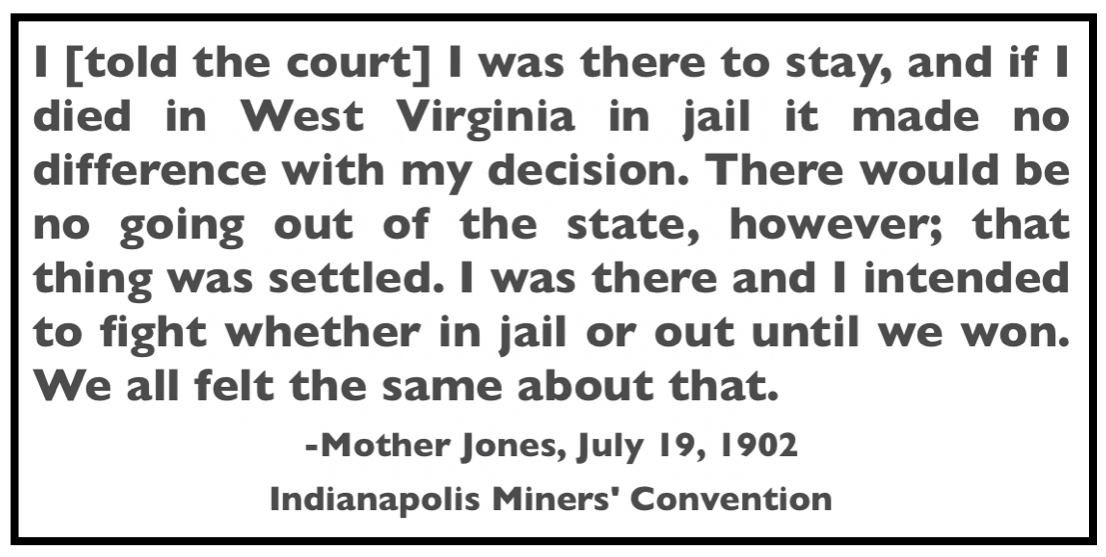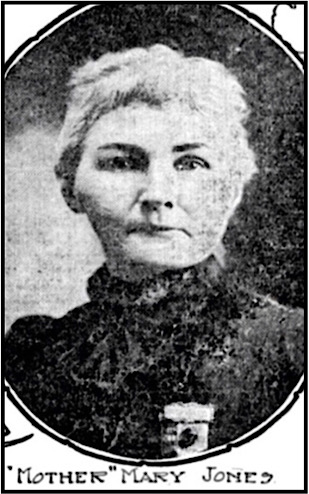 —————
—————
Hellraisers Journal – Sunday July 20, 1902
Indianapolis, Indiana – Mother Jones Speaks to Miners’ Convention, Part I
From the Minutes of U. M. W. A. Special Convention, Called to Consider the Anthracite Strike, Indianapolis, Indiana, July 17-19, 1902:
Mother Jones Addresses Convention
Saturday Morning, July 19, 1902[Part I of II]
President Mitchell: The first order of business, under a motion made at the last session yesterday, is an address by Mother Jones. The work of Mother Jones in the interests of the miners, the sacrifices she has made in their behalf, are so well known to the miners of the United States as to require no repetition from me. I therefore take great great pleasure in introducing to you our friend, Mother Jones.
Mrs. Mary Jones: Mr. Chairman and Fellow Delegates: I have been wondering whether this great gathering of wealth producers thoroughly comprehended the importance of their mission here today; whether they were really clear as to what their real mission was.
I realize, my friends, that the eyes of the people of the United States, from one end to the other, are watching you; but you have again given a lesson to the world and a lesson to the statesmen that a general uprising is the last thing you called for; that you will resort to all peaceful, conservative methods before you rise and enter the final protest. I realize, my friends, what your mission is; but I am one of those who, taking all the conditions into consideration, had I been here would have voted for a gigantic protest. I wanted the powers that be to understand who the miners were; to understand that when they laid down their picks they tied up all other industries, and then the operators would learn what an important factor the miner is toward his support. But, my friends, I believe you have taken the wisest action, that action which the world at large will commend, and which I now commend, believing it is right. I think, my friends, when you go home from this convention it is not the promise you have made here that will be the important thing, but the carrying out of that promise, the doing of your duty in the matter, the fulfillment of your duty as man to man, that is of the greatest importance.
These fights must be won if it costs the whole country to win them. These fights against the oppressor and the capitalists, the ruling classes, must be won if it takes us all to do it. The President said I had made sacrifices. In that I disagree with him, though I do not usually do that, for I hold him very dear. None of us make sacrifices when we do our duty to humanity, and when we neglect that duty to humanity we deserve the greatest condemnation.
There is before you one question, my friends, and you must keep that question before your eyes this fall when you send representatives to the legislative halls. Your instructions to these representatives must be: “Down forever with government by injunction in the American nation.” This generation may sleep its slumber quietly, not feeling its mighty duty and responsibility, and may quietly surrender their liberties. And it looks very much as though they were doing so. These liberties are the liberties for which our forefathers fought and bled. Things are happening today that would have aroused our Revolutionary fathers in their graves. People sleep quietly, but it is the sleep of the slave chained closely to his master. If this generation surrenders its liberties, then the work of our forefathers, which we will lose by doing this, will not be resurrected for two generations to come. Then perhaps the people will wake up and say to their feudal lords “We protest,” and they will inaugurate one of those revolutions that sometimes come when the slave feels there is no hope, and then proceed to tear society to pieces.
My friends, it is solidarity of labor we want. We do not want to find fault with each other, but to solidify our forces and say to each other: “We must be together; our masters are joined together and we must do the same thing.”
I want to explain to some of the delegates here why eleven of my co-workers in the field and myself were arrested and thrown into jail. We had the Fairmont Company practically licked, and as we did our marching and got our camps established the injunction machine began to work, and we had injunctions served against us, and they can grind injunctions out there in daylight and in the dark-it is no trouble to them at all. The Marshal served one on me, and I said to him: “I shall do my duty regardless of injunctions. I am here to do a work and I am going to do it; I think also that my co-workers intend to do their duty. We were not arrested on that injunction, but they served another. You know there is an amendment to every injunction. Well, we discussed the matter, and I said to the boys; “I don’t believe there is any government in the world that can make us go blind; and if the company’s tipple is a certain distance away I am not going to shut my eyes and go blind for the sake of the Fairmont Coal Company.”
We went to the meeting that was held there. There were eight of the organizers there. We held our meeting. I was the only speaker there, and I will confess that I felt particularly irritated that day; in fact, I felt pretty sore, I shall tell you why. One of our boys was beaten nearly to death by their blood hounds as he was coming home from a meeting. A night or two before that three of our organizers and myself were coming home, and we met a boy with a buggy. I was tired, so the boy drove me to the streetcar while the men walked. The company’s store was at the other end of a bridge we had to cross. The guards around the store asked if that was Mother Jones, and I said, “Yes, boys; be good and watch the slaves and don’t let one of them get away or you will lose your jobs in the morning.” I went through it in the dark and sat down. It then dawned on me what an unsafe thing I had done. There isn’t a house there, there wasn’t a human being with me, and six thugs there who might have thrown me into the river and no one would have been the wiser for it or would have known what happened to me.
Just then one of our men came out from the covered bridge yelling “Murder, Murder!” I said, “What is the matter?” It was Barney Rice, and I asked him what had happened to the rest of my boys. He still kept calling for the police, and directly one of the comrades from Indiana came out, and I said: “Where is Joe and John?” and they said, “Mother, they are killing Joe [Poggiani].” I ran towards the bridge, and Joe staggered out all covered with blood, weak, and almost exhausted from loss of blood. I put him on the car and asked the car driver to take us to town as quickly as possible. When we got him to town and examined his injuries we found that he had eighteen cuts with knuckles on his head.
I said at that meeting, “We are on a peaceful mission, and I don’t see why the judge should issue injunctions against us. Why does he not issue injunctions against those thugs who are beating our people to death? We are not armed; no one carries arms, and yet we have injunctions served on us.”
It was weeks before poor Joe was able to get up again. Then we were arrested and taken to Parkersburg at twelve o’clock at night; and the Marshal [Charles D. Elliott], intending to be very courteous to me, said he had engaged a room for me at the hotel. I thanked him very kindly, and he told a deputy to go there with me, and when we got to Parkersburg he said, “Come this way with me,” and I said, “Come with me, boys.” He said, “No, they are going to jail, and you are going to the hotel.” I said, “No, I am going wherever my boys go,” and we all went to jail. Next day, we were all taken before the judge [John J. Jackson], and I was kept on the witness stand for seven long hours, for seven long hours they were questioning me, and the old judge and I made friends with each other. He asked me: “Did you say there was an old gray-headed judge on the bench up there at Parkersburg who thought he was running everything?” I said, “I said to the crowd there is an old gray-headed judge back there in Parkersburg, and he is growing old just as I am myself; we are both getting childish and some day soon we will both die, and then the whole world will miss us.”
Then the judge told me that if I would go out of the state and stay out, and be a good girl generally, he would leave me alone. I asked my lawyer to tell him for me that I said all the devils in hell would not get me out of West Virginia while I had my duty there to perform. I said I was there to stay, and if I died in West Virginia in jail it made no difference with my decision. There would be no going out of the state, however; that thing was settled. I was there and I intended to fight whether in jail or out until we won. We all felt the same about that.
[Photograph, paragraph breaks and emphasis added.]
~~~~~~~~~~~~~~~~~~~~~~~~~
SOURCES
Minutes of United Mine Workers of America
Special Convention, Called to Consider the Anthracite Strike
Indianapolis, Indiana, July 19, 1902
https://cuomeka.wrlc.org/exhibits/show/mother-jones/item/860
https://cuomeka.wrlc.org/files/original/e8a127cff2e927a72bf17df6f97c6617.pdf
IMAGE
Mother Jones , Phl Inq p24, June 22, 1902
https://www.newspapers.com/image/168338244/
See also:
Minutes of United Mine Workers of America
Special Convention, Called to Consider the Anthracite Strike
Indianapolis, Indiana, July 17-19, 1902
https://catalog.hathitrust.org/Record/100879249
The Speeches and Writings of Mother Jones
-ed by Edward M. Steel
University of Pittsburgh Press, 1988
https://books.google.com/books?id=vI-xAAAAIAAJ
https://digital.library.pitt.edu/islandora/object/pitt%3A31735035254105/viewer#page/1/mode/2up
Steel Speeches p15-21 (38 of 360)
https://digital.library.pitt.edu/islandora/object/pitt%3A31735035254105/viewer#page/38/mode/2up
Tag: Great Anthracite Coal Strike of 1902
https://weneverforget.org/tag/great-anthracite-coal-strike-of-1902/
Tag: West Virginia Coalfield Strike of 1902-1903
https://weneverforget.org/tag/west-virginia-coalfield-strike-of-1902-1903/
~~~~~~~~~~~~~~~~~~~~~~~~~
They’ll Never Keep Us Down – Hazel Dickens

